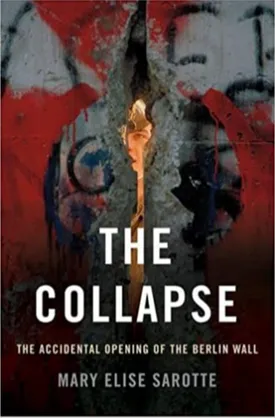Mary Elise Sarotte
Mary Elise Sarotte is an American political historian who has written about topics such as the 1989 fall of the Berlin Wall, Europe after the Cold War, and the history of American foreign relations. Sarotte’s work has earned her numerous awards and accolades, including being named one of Foreign Policy's “top 100 global thinkers” in 2014. Sarotte is currently a professor at the University of Southern California and the Harvard Kennedy School.
Sarotte earned a Master of Philosophy and a Doctor of Philosophy in International Relations from Oxford University in 2000. She then served as a postdoctoral fellow in the History Department at Harvard University and as a visiting assistant professor of history at the University of Virginia. Sarotte has held teaching posts at the University of Southern California, Harvard University, Princeton University and the University of Michigan.
Sarotte has published five books and her work has appeared in many major publications, including The New York Times, The Wall Street Journal and The Atlantic. Her works include The Collapse: The Accidental Opening of the Berlin Wall (2009), Dealing with the Devil: East Germany, Detente and Ostpolitik, 1969-1973 (2014), and 1989: The Struggle to Create Post-Cold War Europe (2014).
The Collapse is a narrative history that describes how the fall of the Berlin Wall in 1989 was triggered by the mistake of two East German government officials. Sarotte’s account begins in 1978 and traces the history of the Wall's collapse up to its eventual destruction in November 1989.
In Dealing with the Devil, Sarotte examines the East German policy of detente and its impact on East-West relations. Sarotte argues that the East German government’s long-term policy of detente, which includes negotiations with the West, set the groundwork for the eventual reunification of Germany.
Sarotte’s most recent work, 1989, examines the history of American and European foreign policy during the Cold War and its legacy in the present day. The book looks at the events of 1989 in the context of both the Reagan administration’s policies and the role played by key individuals such as John Paul II and Mikhail Gorbachev.
Sarotte’s work has had a major influence on the study of international relations, and she is one of the leading experts on the history of the Cold War. She has collected a number of awards and accolades for her work, including the Saxe Prize for distinguished teaching at Princeton University and the Guggenheim Fellowship. Her books are regularly praised for their rigorous scholarship, clear and accessible writing style, and vivid depictions of history.
Mary Elise Sarotte’s scholarship on the history of the Cold War is essential reading for students and scholars of international relations. Her books provide an invaluable insight into why the Cold War ended and how the U.S. and Europe responded to the monumental changes of 1989. Her research is evidence of her commitment to understanding the past and its continuing relevance to the present day.

